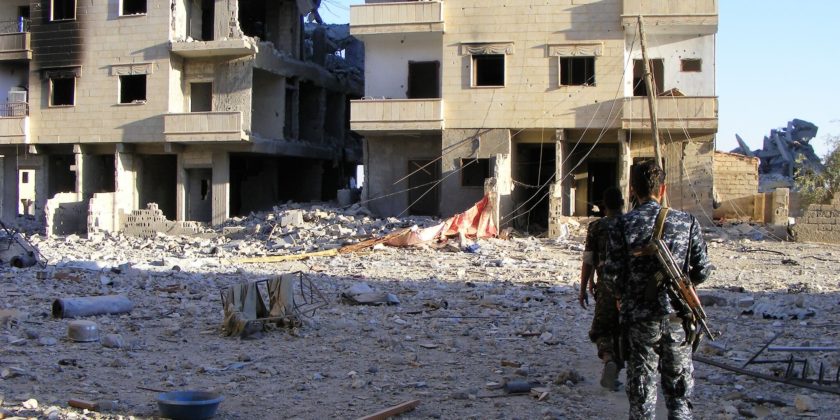“Fuck Raqqa, fuck Raqqa,” a young Christian soldier tells us as we enter the Christian soldiers’ headquarter inside the liberated part of Raqqa, the capital of the Islamic State. Reports European Post.
He is part of a special militia of about 1,000 Christian Syriac soldiers (MFS) incorporated into the SDF (Syrian Democratic Forces) alongside the Kurdish YPG and supported by the U.S.-led International coalition.
“As Christians, we are proudly fighting on the frontline to combat whomever committed a genocide against our people and raped our land,” Matei, a 21-year-old soldier old tells us.
“We are Christians and this land also belongs to us. We fight to take it back and to give a future to our sons and daughters here, where they were born” he says.
All Christians soldiers proudly expose their tattoos with crosses, rosaries and the face of Jesus Christ. In the North Federation of Syria, a self administrated region within Syria, the right to religious freedom is widely accepted and soldiers are not scared to demonstrate their faith.
Inside the headquarter, Kino Gabriel, the spokesperson of the Christian troops underlines the difficulties of the combat. “We are fighting to conquer each meter, one house after the other. We are helped by the airstrikes of the International coalition but DAESH uses civilians as human shields. We are doing our best to save their lives but it extremely difficult,” he says.
We are invited to follow a group of soldiers on the frontline. We jump into a pick up, driving fast in between the ruins while sounds of airstrikes never fade. The city has been completely destroyed and the buildings are almost non-existing. Its panorama can only remind us of the ones seen in some documentaries of Berlin in 1945. And just like the Nazi did at the end of the Second World War, DAESH fighters are using all instruments they can to resist, including baby soldiers.
The car stops outside a building. We cross what used to be a town square, walking on remnants of pebbles. Soldier Matei, who is escorting us, immediately warns us that one of his companion exploded on a mine a few days ago. “You should follow exactly our steps because we still don’t know what there is under the stones!” he says.
On the top floor of one of the buildings we climbed on the square, we can see, from an embrasure, the miserable panorama of what used to be a city some years ago. Up there, the risk of the presence of the infamous ISIS snipers from Chechnya is still omnipresent so we cover ourselves up behind a curtain without flinching.
“We liberated seven Armenian Christians from the hands of ISIS,” Matei reveals. “They were obliged to pay to survive. They were living in sub-human conditions because they were not Muslim.”
“ISIS sends car bombs, civilian and children with explosive belt against us….” and as he mentions the assaults, a loud blast interrupts our conversation. An ISIS car bomb explodes a few hundred meters away from us. The sky over Raqqa turns black. From a radio communication we learn that the attack was directed against a Christian post.
We decide to cross the mined camp again and we run down the square to avoid the snipers. In the middle of the ruins, we see a little pink shoe with a ribbon, maybe lost by a young girl escaping or put there ad hoc by ISIS, filled with explosives. When ISIS soldiers are defeated into retreat their last means of destruction include bombs hidden in bibles, toys, strollers, in a last effort to kill as many as possible even after their collapse.
Back at the headquarter we meet the Christian women fighters. They are smiling mournfully. When asked why they decided to fight, they simply reply that they didn’t have any other choice. It was either fighting or being defeated and dead.
One can see their pride just in their eyes. These Christian fighting women, taking up arms against Daesh and fighting along side men, have done much more for advancing women’s rights so far than decades of Western feminism.
On our way to the refugee camp of Ain Issa, the sun’s fire burns the tents where more than 10,000 people are amassed.
Children playing with kites and women cooking dinner welcome us in the shelter. When we ask about their situation they say that even if they are living in difficult condition, they don’t want to emigrate to Europe. They ask Western countries to help them there before they are obliged to flee. The camp has received financial aid from the self administration of the Federation of Northern Syria and a few International NGOs have started to help this camp concretely in the last few days, Leyla Mustafa ad interim mayor of Raqqa Council says.
Many of the children in the camp have been traumatized by life under ISIS in Raqqa: they grew up watching public torture, violence and mass killings every day. Four-year-old children have even learnt to recognize sounds of airplanes and if they would bomb the city or if they were reconnaissance planes. “There is a plan to assist those children with professional psychologists to help them recover from these shocks but still, negative impacts will be seen for many years” the mayor says.
We leave Raqqa’s area at sunset while some children are rope-jumping. Syria will have to reshape its future with these children, not only from a political perspective but also, and most importantly from a human perspective, avoiding to have a lost generation.
Marco Gombacci




















































